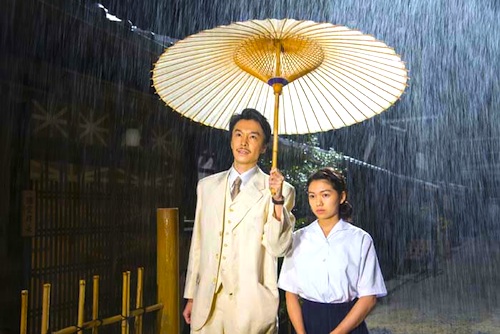By Joe Bendel. The greatest victims of Japanese wartime propaganda were the Japanese people themselves. When the militarist government disseminated apocalyptic warnings that the conquering Allies would rape all women and sterilize all men, the average citizenry largely believed it, so they resolved to fight to the end, because there was no other choice. Yet, in early 1945, just about everyone could tell how the winds were blowing. The home front is an inescapably depressing place for nineteen year-old Satoko, but she will still blossom into a woman right on schedule in Haruhiko Arai’s This Country’s Sky (a.k.a. When I was Most Beautiful), which screened as a selection of this year’s Japan Cuts, the Festival of New Japanese Film in New York.
Today, Tokyo’s Suginami is sort of like the Japanese Upper Westside, but in 1945 it was practically a ghost town. The government imposed rigid restrictions on internal migration, but those who are allowed relocate to the countryside, even though there are reports that life is just as hard there. Living with her widowed mother, Satoko gets by almost okay working as a civil defense office clerk. Unfortunately, making ends meet becomes even tougher when Satoko convinces her reluctant mother to take in her bombed out aunt. Despite her promises, Auntie is mostly dead weight around the house, but Satoko gets some help here and there from their neighbor, Mr. Ichikawa.
The thirty-eight year-old banker just might make it through the war undrafted. He had the good fortune of taking his military physical in a district full of brawny farm lads, where he looked sickly in comparison. He also happens to be married, but his wife was assigned to a government agricultural coop in the countryside, allowing his eye to rove towards Satoko. Her mother recognizes his intentions, but she allows Satoko to continue spending time with him, because different rules apply during war, especially the waning days for the losing side. However, she probably does not realize how much Satoko reciprocates his interest.
While reasonably prolific as a screenwriter, Sky is the first film Arai has helmed since 1997. His sense of visual composition remains undiminished, instilling a vivid sense of Tokyo as a veritable wartime ghost town. Without question, Arai is more interested in exploring the tenor of the times than digging into the melodramatic details of Satoko’s problematic romance. The vibe is not unlike Yoji Yamada’s Kabei: Our Mother, but it does not have the same degree of tragic elegance.

Clearly, Fumi Nikaido works a heck of a lot. Here, she shrewdly plays Satoko with the reserve and maturity of someone who came of age during wartime privation. It is a smart performance that pulls us in, rather than indulging in a lot of melodramatic excess. Still, Hiroki Hasegawa’s Ichikawa seems so conspicuously oily, it is hard to fathom her attraction. However, Youki Kudoh is wonderfully down-to-earth (and even surprisingly sensual) as Satoko’s mother. Frankly, the inter-family relationships between mother, daughter, and aunt are just as important as the simmering attraction shared by Satoko and her neighbor—and Kudoh is the key to their dynamics.
In a way, Sky is something of a revisionist war film that consciously tries to remind the world of the very real suffering of the Japanese people during the war. However, unlike Yamada’s under-valued film, it never explores the domestic dissent to the Imperial war policies. Regardless, it is well worth seeing for the remarkable work of Nikaido, Kudoh, and the design team that recreated bomb-scarred Tokyo in such detail. Recommended for mature viewers who understand the events of the Pacific Theater in their full context, This Country’s Sky screened today (7/18) at the Japan Society, as part of the 2015 Japan Cuts.
LFM GRADE: B
Posted on July 18th, 2015 at 10:00pm.